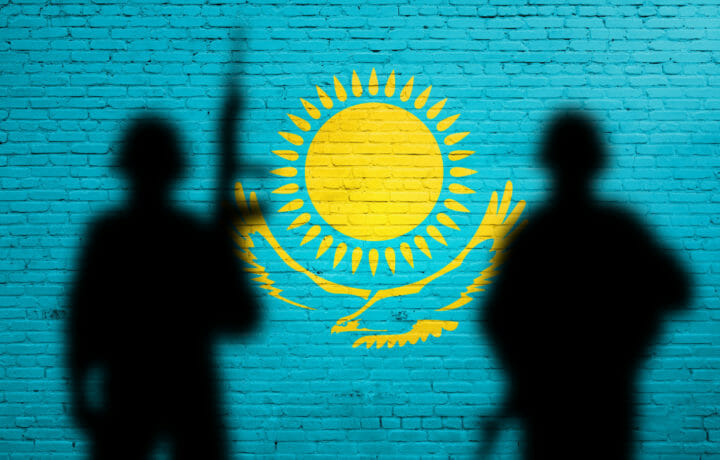As the Ukrainian situation continues to simmer, activities in another neighboring Russian country are being watched closely by the west. Kazakhstan, which borders both China and Russia, is experiencing considerable internal unrest. With protests breaking out on January 2nd over a fuel price hikes, the turmoil quickly spread throughout the country. The rallies quickly escalated due to long-standing grievances over corruption and inequality within Kazakhstan. By January 3rd, demonstrators in the city of Almaty and police clashed, with fire being set to government buildings.
In a surprising move, Kazakh President Kassym-Jomart Tokayev requested the Collective Security Treaty Organization (CSTO) send foreign troops into Kazakhstan to quell the violence. Thousands of Russian-led security alliance troops began arriving four days later, vowing to restore order to the country, leaving scores dead. Called a terrorist uprising on Friday, President Tokayev authorized the use of lethal force against protesters. Yesterday, President Tokayev stated last week’s reports of authorities fighting peaceful demonstrators was “disinformation.”
Russian President Vladimir Putin blamed Kazakhstan’s violent unrest on destructive internal and external forces. During a teleconference, Putin said “The threat to Kazakhstan’s statehood arose not because of spontaneous protests and rallies concerning fuel prices. It is because destructive internal and external forces took advantage of the situation.” According to the state press, deployment of CSTO troops had prevented armed groups from undermining the basis of power in Kazakhstan. Putin stated, “The measures taken by the CSTO have clearly shown we will not allow the situation to be rocked at home” and that the CSTO troops would withdraw once the mission was complete and President Tokayev thought they were no longer needed.
So, What is the CSTO?
Some of us are old enough to clearly remember the fall of the Soviet Union in 1992. After the collapse of the Soviet Union, multiple members of the Commonwealth of Independent States, all former Soviet countries, signed a mutual defense pact known as the Collective Security Treaty (CST), a smaller and less formidable replacement to the Cold War-era Warsaw Pact.
CSTO members have come and gone, with today’s members consisting of Armenia, Belarus, Kazakhstan, Kyrgyzstan, Russia, Tajikistan. Like NATO, the CSTO conducts joint military exercises and is based on the principle of collective defense. Members agree that an attack on one member state is an attack on all members of the alliance. Exemplifying the commitment, President Putin stated over the weekend that the Russian-led CSTO military alliance will not allow member governments to be toppled.
What is next for Kazakhstan?
Observers are watching Kazakhstan closely, after the first deployment of troops from the Russian-led CSTO in its 30-year history. Kazakhstan, the wealthiest Central Asian country, has pursued a “multi-vector foreign” foreign policy, balancing the Russia, China, European Union, since independence in 1991. Suddenly, Kazakhstan appears to be cozying up to Russia.
The Kazakh president exercising an option to call in the CSTO stunned many citizens and baffled international observers. Regardless, the movement of 2,500 troops from the alliance has triggered concerns that Moscow may use the crisis to increase influence over Kazakhstan. The situation has obviously drawn other questions from foreign policy experts. Why would a country invite foreign troops to defend against their own citizens? Does President Tokayev not trust his own military? Should there be questions about Kazakhstan’s sovereignty?
No Evidence of Foreign Linkage
Even though President Putin has said, “…the events in Kazakhstan are not the first and far from the last attempt to interfere in the internal affairs of our states from the outside,” and President Tokayev claiming “international terrorist groups” had seized parts of Almaty and its airport, forcing the request for help from the CSTO, there is no verifiable information about demonstration participation.
Melinda Haring, deputy director of the Atlantic Council’s Eurasia Center, during a Washington Post interview stated, “These claims are beyond thin,” and pointing to a “foreign boogeyman” is a “textbook” move in former Soviet states to deflect domestic discontent. Kazakhstan Internet is largely blocked, and foreign journalists cannot enter. To date, Kazakhstan has not furnished any concrete evidence of foreign involvement.




